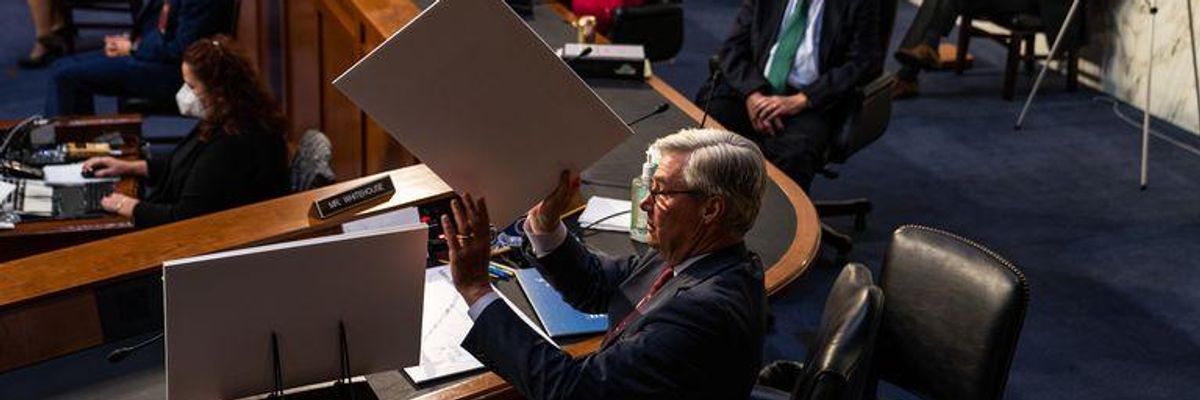The general feeling that the nomination of Judge Amy Coney Barrett to the Supreme Court is the capstone of a lavishly funded, long-term conservative plan to own the federal judiciary for the foreseeable future, and that Barrett's career is altogether a product of that project, has hung over the confirmation hearings like a foul mist. On Tuesday afternoon, Senator Sheldon Whitehouse gave that feeling form and substance, and charts, too.
Whitehouse used every one of his allotted 30 minutes to describe in detail the mechanisms by which conservative activists, fueled by the unlimited corporate money unleashed by Citizens United v. FEC, have fashioned to produce judicial nominees--and, ultimately, judges--on what in the last decade has looked very much like an ideological assembly line. Whitehouse showed in (occasionally excruciating) detail every aspect of the complicated network at the center of which is the Federalist Society, the intellectual wingnut-welfare chop-shop to which this president* outsourced the selection of federal judges.
He then tied all that research into the current full-court press across the federal courts to kill the Affordable Care Act, curb reproductive freedom, and reverse marriage equality, to say nothing of the dozens of cases regarding the money power and corporate control of government that are the real goals of most of the people funding what Whitehouse called, "the schemes." Whitehouse even worked in his favorite statistic--that on those kind of cases, there have been 80 decisions handed down by the current court as 5-4 decision, and the business/conservative side of those cases, which almost always coincides with the interests of Republican donors, is 80-0.
Whitehouse has been a lone voice on what he calls "court capture" for a while now and, on Tuesday, given a half hour, he took his audience, both live and via television, and including the nominee herself, on a tour of the swamp. In doing so, he made a more compelling case against the illegitimacy of this nominating process than anyone else has. He showed the connections between the Federalist Society and the Judicial Crisis Network, and he showed the outsized influence of Leonard Leo and Carrie Severino, activists who have been the puppeteers behind many of these nominations. (Leo headed up the work at the Federalist Society and Severino ran the Judicial Crisis Network. When Leo quit, Severino moved over and replaced him.) Whitehouse turned the machine around and pulled out all the wires.
In all cases, there is big anonymous money behind various lanes of activity. One is through the conduit of the Federalist Society. It is managed by a guy named Leonard Leo and it has taken over the selection of judicial nominees. How do we know? Because Trump has said so, over and over again. His White House counsel said so. We have an anonymously funded group run by this guy named Leonard Leo. We have anonymous funders running through something called the Judicial Crisis Network, which is run by Severino, and it is doing PR and campaign ads for Republican judicial nominees.
It got a $70 million donation in the Garland-Gorsuch contest. They got another donation to support Kavanaugh. Perhaps the same person spent $35 million to influence the makeup of the United States Supreme Court. Tell me that is good. Over here, you have an array of groups funded by dark money that have a different role. They bring cases to the Court. They do not wind their way to the Court, they get shoved to the court by legal groups, many of which get quickly to the Court to get their business done there. And then they turn up in an orchestrated chorus.
The Republicans went predictably into orbit. Ted Cruz tried to throw some statistics back at Whitehouse and Young Ben Sasse snidely referred to Whitehouse's visual aids as "Beautiful Mind charts," referring to the scribblings of schizophrenic math genius John Nash, because Young Ben Sasse rarely misses an opportunity to be an insufferable nuisance. But they couldn't refute the case that Whitehouse had made so relentlessly: that this nomination is a bag job being hustled through to please a half-mad president* who may be howling down the hallways of the White House by now. And that it was planned and executed by a vast and single-minded network of which no parallel exists on the other side.
You have a campaign I talked about where they take $70 million contributions. That is a big check to write, $17 million to campaign for Supreme Court nominees. No idea who that is or what they got for it. You have briefs that she wrote. The Republican senator's filed briefs in that case signed by Ms. Severino. The woman who helped choose this nominee has written briefs for Republican senators. Do not say the ACA is not an issue.
The Crisis Network funds the Republican Attorneys General Association and individual attorneys general. Guess who the plaintiffs are in the Affordable Care Act case? Republican attorneys general. Trump joined them because he did not want to defend it, so he is in with the Republican attorneys general. Here is the Crisis Network campaigning for the nominee, writing briefs for senators against the Affordable Care Act, supporting Republicans who are bringing this case and leading the selection process for this nominee. Here is where they are. Mitch McConnell, Senator Collins, Senator Cornyn, Senator Holden, who is still here? Marco Rubio, a huge assortment of Republican senators who Severino wrote a brief for against the Affordable Care Act.
It's really all the Democrats have for a role in this puppet show. They can educate the public as to how we came to this pass, and they can educate the public as to what will happen when the curtain finally gets rung down on the performance. As Whitehouse said to sum up his presentation, when you find hypocrisy in the daylight, look for the power in the shadows.




